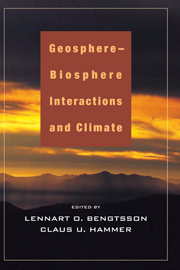Book contents
- Frontmatter
- Contents
- Dedication to Hans Oeschger
- List of Contributors
- Preface
- Introduction
- 1 The Antarctic Ozone Hole, a Human-Caused Chemical Instability in the Stratosphere: What Should We Learn from It?
- PART ONE THE ANTHROPOGENIC PROBLEM
- PART TWO THE HUMAN PERSPECTIVE
- PART THREE MODELING THE EARTH'S SYSTEM
- PART FOUR INFORMATION FROM THE PAST
- PART FIVE HOW TO MEET THE CHALLENGE
- 16 Toward a New Approach to Climate Impact Studies
- 17 Research Objectives of the World Climate Research Programme
- 18 Panel Discussion: Future Research Objectives
- Index
- Plate section
16 - Toward a New Approach to Climate Impact Studies
Published online by Cambridge University Press: 04 August 2010
- Frontmatter
- Contents
- Dedication to Hans Oeschger
- List of Contributors
- Preface
- Introduction
- 1 The Antarctic Ozone Hole, a Human-Caused Chemical Instability in the Stratosphere: What Should We Learn from It?
- PART ONE THE ANTHROPOGENIC PROBLEM
- PART TWO THE HUMAN PERSPECTIVE
- PART THREE MODELING THE EARTH'S SYSTEM
- PART FOUR INFORMATION FROM THE PAST
- PART FIVE HOW TO MEET THE CHALLENGE
- 16 Toward a New Approach to Climate Impact Studies
- 17 Research Objectives of the World Climate Research Programme
- 18 Panel Discussion: Future Research Objectives
- Index
- Plate section
Summary
Introduction
There is now a growing consensus that human activities are having a discernable effect on the Earth's climate (IPCC, 1996). An enormous amount of effort has gone into the scientific research that forms the basis for this judgment. There is also growing concern that such human-influenced changes to the Earth's climate could have negative effects on human societies and on the Earth's ecosystems and therefore that these changes should be avoided or slowed. This, in turn, has led to efforts to mitigate the human influence on climate, most notably through measures to slow the build-up of greenhouse gases in the atmosphere (e.g., the Kyoto Protocol). Critical to this line of argument, which calls for serious attempts to mitigate climatic change, is the view that the impacts of climatic change will be so serious and so difficult to deal with that mitigation is preferable to adaptation, that is, to accepting that climatic change is and will continue to occur and adapting societal activities to it. Thus, although more work is certainly needed for us to understand the nature of the climate itself, there is a rapidly growing demand to determine what the impacts of climatic change actually are and what they are likely to be: how serious they are, how much they will cost, what types of changes will be irreversible, and so on.
- Type
- Chapter
- Information
- Geosphere-Biosphere Interactions and Climate , pp. 273 - 279Publisher: Cambridge University PressPrint publication year: 2001
- 1
- Cited by



